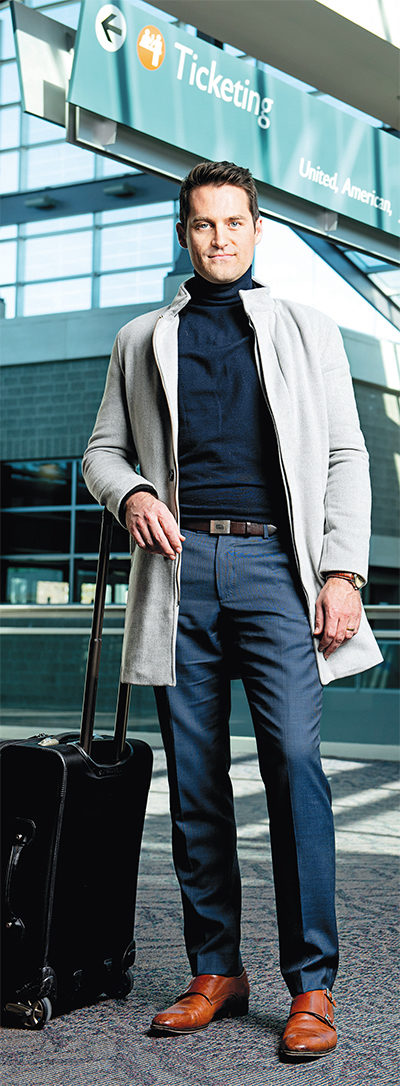
Ben Chevrette is Babson’s director of regional and international advancement.
Photo: Webb Chappell
Ben Chevrette is the very definition of a frequent flyer. As Babson’s director of regional and international advancement, he wings around the world, meeting with members of the College community to raise support for the institution. “I travel extensively, from South Africa, to many spots in Asia, to Europe, to Latin America,” he says. “There is no place we don’t have alumni and supporters of the College.” While all the traveling is exciting, Chevrette confesses to being a homebody. When not on the road, he likes spending time at home or on campus, where he often eats in Trim Dining Hall. “I see the students,” he says, “and I’m reminded what this is all for.”
Where have you been lately?
I just returned from India. You can’t find two places that are more different than Mumbai and Wellesley. I am reminded that our students from India have to adapt to a new culture, a new style of learning, and they excel. That’s a testament to the students we attract. And it’s a testament to my colleagues at Babson. They have created a welcoming environment, where students from any part of the world can excel.
What kind of reception do you receive during your visits?
There is red-carpet treatment for any Babson representative who travels internationally. People invite me to their homes, to their clubs, and introduce me to their families. I’ve never experienced a warmer reception. I’ve met with heads of state and CEOs of multinational corporations. The energy people have for this College is amazing.
How is that energy translating into support?
Babson’s average fundraising amount internationally used to be about $1.5 million a year. Last year, we raised $13 million.
What do you like about your job?
I have found a career in which I meet people and help them realize the type of impact they want to have. That’s rewarding. I think of Babson as a platform. People invest here to make change. There is no cause you can’t impact with Babson as your vehicle. Global health issues. Climate change. Really, anything. If you care about hunger, you can give to a food bank, and that will give food to people. That’s noble. But you can give to a school like Babson that trains entrepreneurs, who may address the causes of global hunger and find solutions. – John Crawford
“When I asked my dad about his prospects for the company—selling the business, joining with other businesses, selling shares, or becoming public—the first thing he asked me was if I really wanted to be part of the business,” Isidoro says.
His dad, Leo Katz, wasn’t expecting so many questions. “But,” says Isidoro, “it was also reassuring to see how much he wants us to continue with the business and work alongside him.”
Conversations like these, in which family members tackle challenging questions about the family business, underline the goal of Babson’s new Family Amplifier course, part of the College’s Institute for Family Entrepreneurship (IFE).
Started in 2018, almost 100 years after Babson opened with a founding mission to educate the next generation of family business leaders, the IFE launched to better serve the numerous students with family business backgrounds. Among Babson’s undergraduates, approximately one-half hail from families with businesses.
The institute’s latest offering is its Amplifier course, a unique program designed to prepare students for a future role in their family enterprise. Students engage with their families, asking thoughtful, investigative, and sometimes tough questions. The course offers an immersive experience to create a shared business vision that includes the next generation.
Lauri Union, executive director of the IFE, says the Amplifier embodies Babson’s philosophy of creating economic, social, and family value across generations and time. With 70 percent of the global GDP stemming from family businesses, Union believes facilitating conversations about the entrepreneurial legacy of the family is key.
“The homework involves students interviewing their parents, so it is a family experience happening while the students are in school,” she says. “While it is unique, we think it’s essential in terms of families being able to explore their values together and foster their capacity to act entrepreneurially.”
The first student cohort went through a competitive application process. Originally, organizers planned to accept 10 students for the launch, but with 50 compelling submissions from students all around the world, they expanded to 20. Families had to be engaged in an entrepreneurial venture such as a business, a family office, or an investment platform.
The initial group included many international students with family businesses ranging in size from two to 60,000 employees. Some students have worked with their family business in the past, and some haven’t been as directly involved, but all are eager to explore the dynamics of family entrepreneurship with each other and their relatives.
The program includes twice-monthly classes where students discuss family business concepts, engage with guest speakers, and learn about each other’s operations. The homework—exploring the business’s history and potential and talking to involved family members—is what sets the class apart. The process has been eye opening for students.
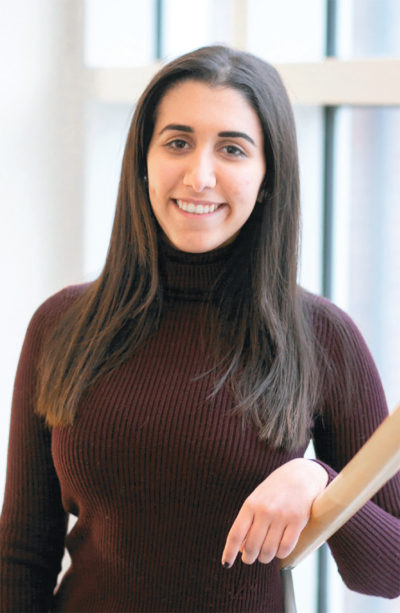
Through the Amplifier program course, Nicole Atala Asfura ’19 connected with her family in a new way.
Fostering Family Dialogue
Nicole Atala Asfura ’19 entered new territory by having these kinds of conversations with her family, which owns a third-generation, Honduras-based financial business, one of the biggest enterprises in the nation and Central America. Helmed by Atala’s father and his four brothers, Grupo Financiero Ficohsa operates in four countries and has several U.S. branches.
Atala, who will graduate in May with a double concentration in strategic management and entrepreneurship, says she was drawn to the Amplifier course. She knew family members’ roles in the business needed further discussion.
“I saw the Amplifier program as an opportunity to provide support on what our goals should be,” she says of the fast-growing company, “and an opportunity to experience this with the insights of other families, alumni, and resources connected to the program.”
Atala admits she found the required discussions with her father and uncle challenging at first, as the men offered only one-word answers without much elaboration. But once she pressed for specifics, she connected with them about the business in a different way. She’s excited to gain knowledge on operations, future projects, and their five-year plan.
Her father, Luis Alberto Atala Faraj, also knew it was important for the family to be in sync on issues of entrepreneurship. He says he benefited by connecting more with his daughter and hearing her point of view. “It makes us reflect on aspects of the family business we need to think more about.”
Strengthening Bonds
Elizabeth Reed ’19 grew up working as part of the third generation of her family business, Storee Construction, an industrial construction company that her mother and two uncles own in Missouri. Under the guidance of her mother, Reed worked in almost every department of the business, including accounting, purchasing, human resources, and project and safety management.
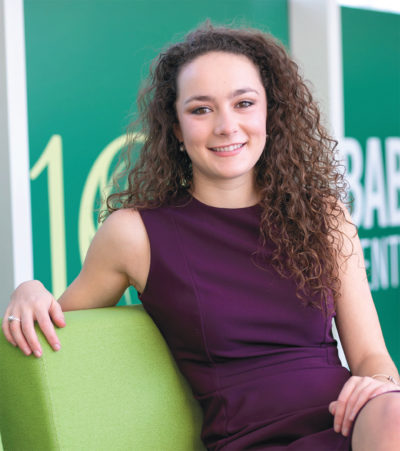
Through conversations with her mother, Elizabeth Reed ’19 knows she’ll be able to shape her role in the future of the family business.
Reed came to Babson to pursue her interest in business as a Center for Women’s Entrepreneurial Leadership Scholar and member of the women’s varsity soccer team. As a senior, Reed was thrilled to be one of the 20 students in the pilot Amplifier course, and she appreciated the chance to have her mother, Amanda Reed, directly involved in her schoolwork and education.
One of the first class projects focused on goals and leadership, and Reed asked several members of her family to create and prioritize a list of life and business goals.
The conversation with her mother included guided questions around her mother’s vision for the company, “her vision of me as her daughter, and the opportunities to be involved in the continued growth of the company as a part of the family business’s third generation,” Reed says.
“Together, we explored the goals my mother had as a business owner and the value she saw in utilizing the capabilities and interests I’ve developed both inside the company and outside, while pursing my management consulting career.”
These conversations also gave Reed the confidence that her family will give her an opportunity to help shape how she is involved in the future of the business.
“Through the Amplifier course, Elizabeth also gained insight into navigating the power dynamics that are inherent to all family businesses,” Amanda Reed says.
Elizabeth Reed always intended to stay involved with the family business, but says the Amplifier course helped her build a more concrete plan for the future. Throughout her four years at Babson that involvement has ramped up; she’s focused on systems integration to help create a new competitive edge for Storee’s project management.
Focusing on Family Interaction
Matt Allen, faculty advisor to the IFE and academic director of the global Successful Transgenerational Entrepreneurship Practices Project at Babson, says he created the Amplifier course based on his experience teaching other family entrepreneurship classes, and worked with other Babson faculty to develop the class. The program will launch in the graduate school this fall.
“According to family theory, relationships and interaction between family members play a key role in how families understand themselves and each other,” Allen says. “More importantly, the quality of interactions can define the ability of families to work together. In typical business education, the family is ignored. Instead, emphasis is placed on content such as operations, finance and marketing—but this content does not prepare students to actually function effectively within the family.”
Students, he adds, are often transitioning from a traditional parent-child relationship into one that will eventually become more professional. “As students study away from home and the family, the relationship does not mature as quickly as the students themselves. The family is learning to readjust and come to a new balance of understanding based on new roles in the family and the business. Thus, the name of the course; we are amplifying the family’s ability to build and grow entrepreneurially.”
The class will eventually cover three years of the undergraduate experience, with the current course, focused on enhancing family relationships, offered to sophomores. As juniors, students will concentrate on improving their understanding of the business and work with their family to discover entrepreneurial opportunities. As seniors, students will work directly with their families to fulfill one of the opportunities defined during their junior year.
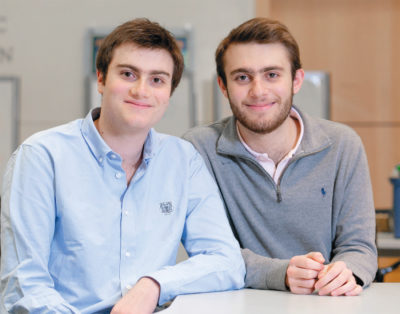
Twins Isidoro (left) and Jonathan Katz ’21 discovered how much their father wanted them to work in the family’s business in Bogota.
Continuing on the Amplifier Journey
Isidoro Katz will continue on the Amplifier path as it evolves. He was born into his Bogota, Colombia, family business, comprised of more than 20 restaurants and food purveyors, mostly under the Zona K brand. Katz’s sister, Michelle, graduated from Babson in 2017, and twin brother Jonathan is currently in the Amplifier program with him.
He appreciates connections he made in the classroom: “I really liked how we could connect with other students and learn what they are doing, how they are similar or different, and what they value the most.”
Before he started the Amplifier course, Katz didn’t know if he wanted to return to Bogota and join the family business immediately after graduation, or follow in his older sister’s footsteps and take some time to work in the U.S. He’s still unsure of his path, but knows he will ultimately work in his family business.
Whatever Katz decides, this course will help him reach his goals by amplifying conversations for the next generation of family entrepreneurs.
Paige Wolf is a freelance writer in Philadelphia.
]]>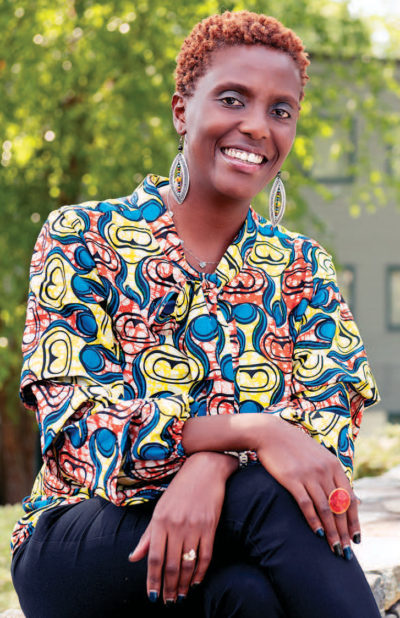
Photo: Webb Chappell
Waceke Nduati has been a participant and an instructor in the “Launch and Grow” program.
“At Babson, I had an ‘aha moment,’” Waceke says. “Women carry a lot of ‘we’re not good enough,’ no matter what fantastic things we’ve done. But I realized, ‘My goodness, I am enough.’ You leave Babson knowing you are enough.”
And that is more or less the point of the program, says Susan Duffy, executive director of the Center for Women’s Entrepreneurial Leadership, who co-leads the program with Mary Gale, senior lecturer of entrepreneurship. “A lot of what we’re doing,” says Duffy, “is opening thinking around how big and bold you can be, to really change expectations around what kind of impact you can have.”
Participants have represented a range of industries, from sports to fashion to marketing to food. They face many of the same challenges that entrepreneurs often confront, but, as women and Kenyans, they encounter other obstacles as well. For example, Waceke explains, “Historically, women have not been inheritors of property and do not have the traditional security that banks want.” Hence, just obtaining a loan can be difficult.
The program offers concrete skill building, with classes on pitching, operations, and finance. But what Duffy describes as “Babson’s special sauce” is the ability to create an environment that promotes what she calls “self-efficacy.” The women test and try ideas, learn from not just the faculty but their cohort, share stories, help ease one another’s anxieties, and act as champions for one another. “Those elements combine to create an environment where people say, ‘I’ve got this.’ That’s self-efficacy,” Duffy says. “They might come in thinking, ‘Well, I have this business,’ but they leave thinking, ‘I’m just getting started; the sky’s the limit.’”
Waceke says she joined the 2017 cohort because she wanted to be in a different environment and gain new perspectives. “I was at that stage where I was tired of hearing my own voice,” she says. The program made her realize that her organization needed a cultural shift. “I cannot be the only entrepreneur in the company,” she says. “I had to create an entrepreneurial culture. Setting up ET&A was the first thing I did when I came back.”
This year, Waceke returned to the program as an instructor, co-teaching a session with Mary Gale. Waceke was excited to help her countrywomen undergo the process she found so invaluable. “The program showed me how to think like a leader,” she says. “It is really transformational.”—Jane Dornbusch
]]>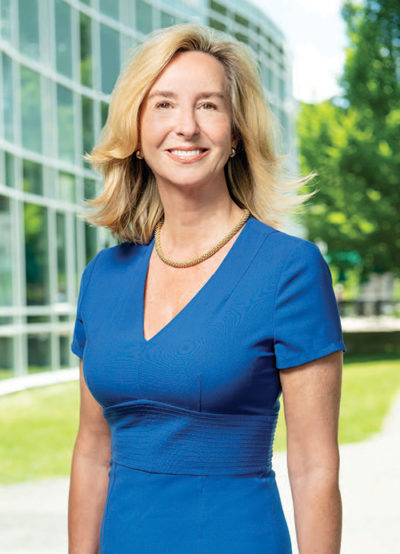
Photo: Webb Chappell
Babson President Kerry Healey
The weekend featured an impressive collection of speakers, panelists, and international business leaders, facilitating thoughtful discussions and a lively exchange of ideas about the future of global enterprise and entrepreneurship. This year, we also were joined by 27 student ambassadors, including several of our incredible Global Scholars, who inspired us with their vision and ambition to create economic and social value everywhere.
One of the highlights of this year’s conference was the official launch of Babson’s Institute for Family Entrepreneurship, a new hub of teaching, research, and innovative programs dedicated to advancing entrepreneurial families around the world. An estimated 70 to 90 percent of annual global GDP is created by family businesses, according to the Family Firm Institute, and studies show that family businesses tend to be more socially responsible and focused on the triple bottom line of people, planet, and profits. The multigenerational survival of family enterprises is critical to global job creation, prosperity, and positive social impact.
When Babson was founded nearly 100 years ago, its primary focus was to educate the sons of businessmen—in 1919, Babson was all male—and prepare them to take over their family businesses. Since then, Babson has remained at the forefront of educating entrepreneurial families and conducting research and programming to help them achieve continued growth. Today, half of Babson’s students come from entrepreneurial families, and as we approach our Centennial, supporting family enterprises remains a key priority.
BCW also provided an opportunity to introduce Lauri Union, the Institute for Family Entrepreneurship’s new executive director, to the Babson community. Lauri has a long history of supporting entrepreneurial families and is known for the turnaround and sale of her family business after becoming its president and CEO when she was just 27. Under her direction, the Institute will continue Babson’s role as an innovator and leader for family entrepreneurship (for more, see Entrepreneurship Through the Generations).
During the past four years, BCW has grown and evolved into the world’s foremost gathering of entrepreneurial thinkers. I am excited to share that next year, as part of Babson’s Centennial celebrations, BCW will come home to Babson with events in and around Boston’s innovation ecosystem.
After a wonderful BCW experience (to see photos from Madrid, go to Connections), I’m happy to be back in Wellesley, enjoying a beautiful New England summer and preparing to welcome the Class of 2022 to campus this fall. I hope you have enjoyed a relaxing summer with family and friends, and I look forward to seeing you at Back to Babson in September.

Kerry Healey
]]>Dr. Mack Cheney certainly felt so, at least initially. He’s a co-founder of the Steven C. and Carmella R. Kletjian Foundation, which strives to improve the safety, affordability, and quality of surgery in the world’s poorest places. The work of the organization is vital. According to The Lancet Commission on Global Surgery, a staggering 5 billion people do not have access to safe and affordable surgical and anesthesia care.
Cheney co-founded the Kletjian Foundation with Carmella Kletjian, a member of Babson’s Board of Trustees, and she pushed for the Boston-based organization to work with the College. “It was very insightful and visionary that she took this approach. I didn’t understand it at first,” admits Cheney, a professor at Harvard Medical School. “I remember thinking, why would we partner with an entrepreneurial school?”
The unlikely partnership still puzzles many clinicians whom Cheney knows. “A lot of my surgical friends,” he says, “shake their heads and say, ‘Why would you do that?’” But setting up surgical care in a developing country is a complicated endeavor, requiring far more than medical expertise. Innovative approaches to business, leadership, and entrepreneurship also are necessities. With Babson’s expertise, the foundation aims to establish surgical care that is self-sufficient, sustainable, and not dependent on the outside help of clinician volunteers, who typically travel to developing countries to perform care but soon depart.
“We need more than the old way of parachuting in and then leaving,” says Kletjian. “It isn’t sustainable. We need to build an ecosystem. Having surgery, running hospitals—it’s a business. We need to teach others how to do it.”
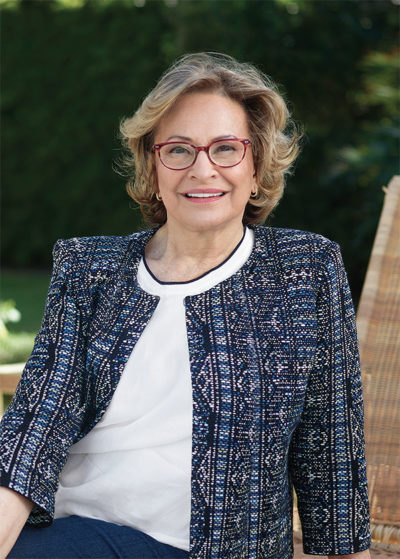
Photo: Jeffery Salter
Carmella Kletjian, Babson trustee and co-founder of the Steven C. and Carmella R. Kletjian Foundation
People Dying Unnecessarily
The Kletjian Foundation has made a significant investment in Babson. It not only has established an endowed Distinguished Professor in Global Surgery (a position it hopes will be filled this year), but also funded the Schlesinger Fund for Global Healthcare Entrepreneurship, a multifaceted initiative housed within The Lewis Institute that’s involved in research, student programs, and educational activities.
Kletjian long has known about the strengths of Babson. Her late husband, Steven Kletjian, attended the College, leaving before graduating to take over the family maintenance business after his father had passed away in 1969. Steven Kletjian grew that business, Unicco Facility Management, from about 55 employees when he took over to more than 18,000 when he sold the company in 2007. He passed away that same year.
Carmella Kletjian started the foundation in 2012 with Cheney and John Freeman, the former president and managing director of investment firm Quabbin Capital. Kletjian’s interest in medicine stems from her 30-year career as a surgical nurse anesthetist. “I was a nurse for most of my life,” she says. Through her work, she met Cheney and other clinicians who went on medical missions and soon came to realize what a tremendous unmet need exists for surgical care around the world. “You go in some countries, and they have to walk miles to get care,” Kletjian says.
In his 30 years of delivering care in developing countries such as Guatemala, Haiti, Ecuador, and Kenya, Cheney has seen this need firsthand. “People are dying unnecessarily,” says the otolaryngologist. “People are dying of benign disease.” Basic surgical care could make a major difference. A patient in a developing country may have a benign growth on his face, for instance, that he can’t have removed because there are no surgeons in the area. “When the lesion is neglected, it becomes life-threatening,” Cheney says. “If the same patient had lived in Boston, it would have been a small growth an oral surgeon would have removed.” Cesarean sections are another example of commonplace procedures that are desperately needed in some developing countries. “The mortality rate during childbirth in many developing countries is staggering,” Cheney says. “If C-sections are available, mortality rates for both mother and child go down.”
The Kletjian Foundation offers surgical training to local clinicians, but performing surgery in these poor places is much more complicated than, say, running a health clinic that gives vaccinations. “You can run that out of a garage if you have the vaccines,” Cheney says. Surgeons in a developing country are confronted with questions such as does the facility have reliable electricity and clean water? Do the instruments work? Does it have a steady supply of oxygen? Clinicians also must consider what kind of access to care their patients have, how they will pay for services, and if they have insurance.
For help addressing core questions of infrastructure, supplies, and access—the very issues that will determine whether surgical care in a developing country remains sustainable—the Kletjian Foundation has turned to Babson. Although the foundation has a number of partner institutions, including Harvard Medical School, Boston-based teaching hospitals, and the World Health Organization, the group’s only nonmedical affiliate is the College. The foundation encourages its partners to meet and collaborate, and Babson brings a pivotal business and entrepreneurial point of view. “If we just had a room full of surgeons, there would be very little divergence of opinion,” Cheney says.
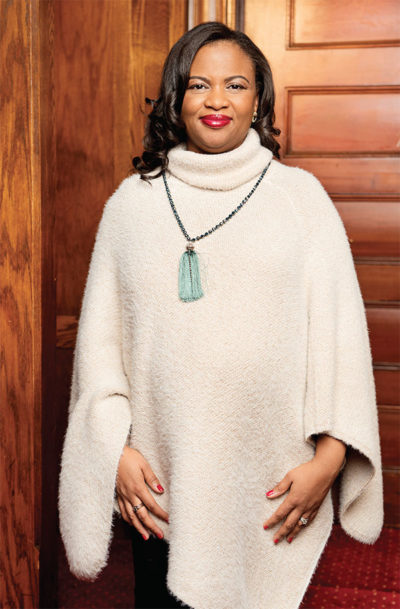
Photo: Webb Chappell
Wiljeana Glover, faculty director of the Schlesinger Fund for Global Healthcare Entrepreneurship
Babson’s Role
To understand more fully how Babson is having an impact on medical care, consider the work of the Schlesinger Fund for Global Healthcare Entrepreneurship. Supported by the Kletjian Foundation and named after former Babson President Len Schlesinger, the fund was founded in 2013 and since then has organized a number of programs that, at their heart, explore the role of entrepreneurship in global health.
Providing study-abroad opportunities for Babson students is one of its objectives, says Wiljeana Glover, faculty director for the Schlesinger Fund. For example, a fellowship has sent MBA students to Uganda to help in an accelerator focused on medical devices and technology. Teams in the accelerator are developing a variety of helpful products, from a locally produced hand sanitizer to a telehealth platform offering support for midwives by connecting them with doctors. “We’ve been able to infuse ET&A thinking into the way they’re approaching things,” says Glover, an assistant professor of technology and operations management.
The Schlesinger Fund also brings experts and entrepreneurs to campus for its Disrupting Global Health Seminar Series. One memorable session, says Glover, involved Dr. Mahmoud Hariri, a surgeon from war-torn Syria. “He was talking about how they’re taking care of people in the middle of a war, and how they’ve created hospitals underground,” Glover says. Case studies and research are another priority of the Schlesinger Fund. One of its cases examined how a doctor working in Uganda was able to develop an alternative, low-cost treatment for hydrocephalus (sometimes called “water on the brain”). Another case study in Uganda looked at how a hospital was implementing an electronic database of patient information that potentially could be rolled out to low-resource areas across the country.
Glover found the innovative and entrepreneurial actions of the clinicians in these cases to be striking. “Some of the doctors might have been creating new products; others might have been creating new processes. They taught us a lot about seeing entrepreneurial leadership in places we weren’t necessarily expecting it,” she says. “Very few, if any of the cases, were driven by folks with MBAs. These are clinicians who have just figured this out on the ground.”
Glover wonders what could be achieved if more clinicians, especially those in the developing world, were exposed to these sorts of skills. If doctors were trained regularly in entrepreneurship, leadership, and business, could they accomplish even more innovation? “If this is what it takes to move the needle on global surgery and global health, then how do we train people in this?” Glover says. “We have to think about workforce training beyond surgical skills. If we’re going to be innovative, we need to think about entrepreneurial opportunities. Surgeons will have to create new models of care. They’ll have to open up their own clinics. They’ll have to develop some new product or service.”
The Schlesinger Fund will begin to test the possibilities of entrepreneurial training. A program focused on Haiti that’s currently in the planning stages will provide education for doctors and other stakeholders such as insurers and suppliers. Glover says the country already has many clinicians who improvise and innovate, but this program, with training sessions to be held potentially at Babson and in Haiti, is designed to amplify those actions. “We’re coming in and saying, how can we make that systemic?” she says. “How do we build that into the way that we’re thinking about medical training?”
With Babson providing valuable expertise, the Kletjian Foundation’s ultimate goal is sustainability. It has worked in Uganda, Haiti, and Ecuador and is looking at Peru in the future, but eventually the foundation expects its help won’t be needed in any of these places. As Cheney says, “We’ll just be sending holiday cards back and forth.”
The implications of such sustainability could be far-reaching, notes Kletjian. Surgical facilities that are sound and safe will bring not only better health outcomes but also much-needed jobs, from doctors and nurses to lab technicians to administrative assistants and more. “Ideally, we’re building an economic engine,” Kletjian says. “I get very excited about this.”
]]>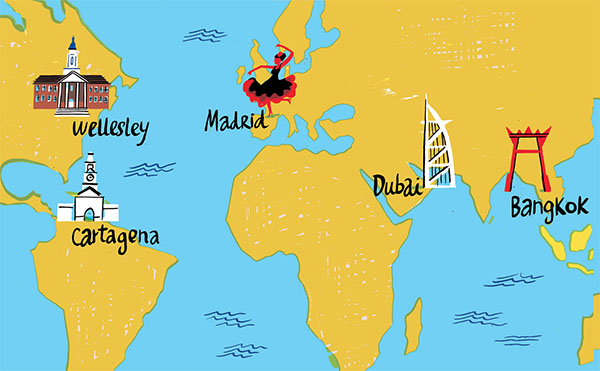
Illustration: Joao Fazenda
In the fall of 2014, President Kerry Healey called Kim Kimball into her office. “She said, ‘Kim, I have this amazing campus. I have alumni from 114 countries. I can’t get them all to come here for Back to Babson and alumni weekends. We need to go to them,’” says Kimball.
Thus began Babson Connect: Worldwide, a global entrepreneurship summit for the Babson community and business leaders. Kimball is the managing director of the three-day conference, which includes educational sessions, a gala and awards dinner, cultural events, and plenty of opportunities for networking.
The first summit, in the spring of 2015, was in Cartagena, Colombia. “The thinking was, if we can’t make this summit work in Latin America, then we can’t make it work. Our alumni in this region are so passionate about the school,” says Kimball. Trustee Carlos Mattos, MBA’76, P’17, ’20, suggested Cartagena both as a destination that people would be interested in and for its cultural significance. Despite last-minute worries—“Two weeks before the event we had only 70 people registered,” says Kimball—the conference was a resounding success, with more than 230 attendees and positive feedback from all.
Since then, the summit has continued its travels around the world and grown in attendance. In 2016, Dubai in the United Arab Emirates was the destination, and the following year the summit journeyed to Bangkok. This year, it was in Madrid, and more than 350 people attended. Each conference in some way reflected the culture of the region, from session topics to renowned local entrepreneurs appearing as guest speakers.
In 2019, Babson Connect: Worldwide comes to Wellesley in honor of the College’s Centennial celebration. “That was always part of Kerry’s vision. Let’s go around the globe and then bring it back here for the Centennial,” says Kimball. But the summit won’t stop there. “Now that it has traction, people want it to keep going. It’s a signature event for the school.”—Donna Coco
]]>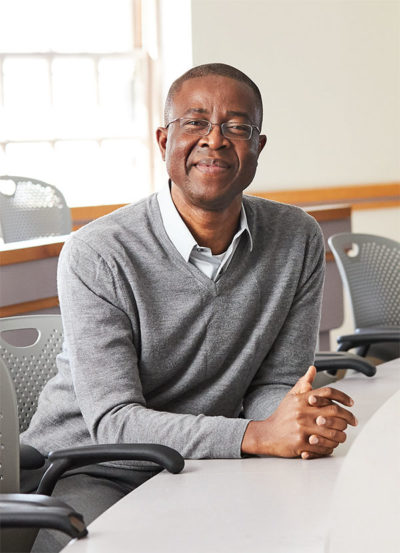
Photo: Pat Piasecki
Vincent Onyemah, associate professor of marketing
Vincent “Vini” Onyemah, associate professor of marketing, was born in Ibadan, Nigeria, and is a member of the Igbo tribe. People in his tribe, he says, believe that their destinies are under their own control. “We are always trying new things,” he says.
In the tradition of his tribe, Onyemah’s personal philosophy is to live life outside of his comfort zone. “Strength comes through misfits,” he says. Not the socially maladjusted kind, but the type of “misfit” in which something seems out of place or illogical. “From the time I was born, my life has been a series of misfits,” Onyemah says. For instance, he was born on the wrong side of the bloodiest civil war in his country’s history—“It was Nigeria against my tribe”—and his family had to go into hiding for several years. Then in elementary school, Onyemah attended a Catholic school in a Muslim neighborhood.
But these challenges have made a huge difference in Onyemah’s life. “You learn about yourself, how to humble yourself,” he says. “You think you know something, but then you meet people, go places, and you say, ‘hey, no.’ It’s helped me to never take anything for granted. It taught me the value of trying to ask the right questions, and to realize that you don’t know what you don’t know.”
Onyemah would feel like a misfit many more times in life. A star soccer player in high school, he wanted to try to become a professional. Onyemah also loved business, which he learned about from working with his mother and father. His mother had a stall in the local market where she sold spices and dried fish. From her, Onyemah learned the art of interacting with people. His father, a secretary in the College of Medicine at the University of Ibadan, was an entrepreneur on the side, selling cleaning supplies. Onyemah would join him on trips to negotiate contracts and then help source and sell the supplies.
But Onyemah didn’t become a professional soccer player or go to college for business. His father, inspired by his co-workers at the College of Medicine, wanted one of his seven children to be a doctor. After winning one of eight full scholarships to college in a national competition, Onyemah seemed the likely candidate. “But I’m scared of the sight of blood,” he says. “I suffer more than the patient just looking at it.” So he bargained with his father. “I told him, I don’t think I would be able to study medicine. But I love math. Ask your friends at the university which subjects have more math, and that’s what I’ll study.” His father came back to Onyemah with an answer: civil engineering.
Although he didn’t enjoy his studies, Onyemah excelled. For a year after graduating, he worked as a civil engineer to complete his required service to his country. Then he had an opportunity to earn a PhD in engineering with a full scholarship to King’s College London. Instead, he decided to follow his passion and study business at the IESE Business School in Barcelona, Spain, receiving a scholarship from a foundation. Onyemah chose IESE because this time he actually wanted to be a misfit. “People would say, ‘You’re crazy, going to Spain,’” he says, because he didn’t know the language or culture. “And I’d say, ‘Yes, I know.’” But he thrived, and he came away with both a degree and fluency in Spanish. Onyemah chose a similar path when earning his PhD. “I wanted to go out of my comfort zone again,” he says, so he went to study at Insead in Fontainebleau, France, earning his degree and becoming fluent in French.
When looking for a teaching position, Onyemah chose Boston for the reputation of its universities and its location. “I had in my mind that I was going to travel, and Boston is not too far from the rest of the the world,” he says. Although he was intrigued by Babson, no positions were open, so he accepted a position at Boston University. About six years later in 2009, he learned of an opening at Babson, applied, and joined the faculty that fall. The smaller, entrepreneurial school fits Onyemah’s personality. “You’re not afraid to think differently, to get out of your comfort zone and make something happen,” he says.
One course that Onyemah helped create is “Sales in Action,” which teaches students how to be persuasive and communicate their value. The course focuses on sales, but the skills it teaches apply to many aspects of life. “When you make a request of any nature, that is selling,” he says. “In today’s world, there’s hardly anything you can do if you don’t have the ability to present a compelling case.”
As a professor, Onyemah continues to push himself out of his comfort zone. Last academic year, he took a sabbatical and moved with his family to Mexico City. Friends and family once again questioned his choice, but his wife and three children were thrilled with the experience. “Now they speak Spanish, they made new friends, and they see Mexico for what it really is,” he says. In Mexico City, Onyemah did research on sales-force management and practices in Latin America, continued work he was doing with the Babson Entrepreneurship Ecosystem Platform, co-authored an article for the Harvard Business Review, and finished the book he co-authored, Entrepreneurial Selling.
Onyemah never plans to stop being a misfit. Over the course of his career, which also includes working with the International Finance Corp. and consulting, he has lived in five countries for at least a year and has been to more than 20. “Now I go to many parts of the world, where people think I’m a misfit, and I’m still able to serve and make an impact and relate with the people,” he says. “It’s helped me to never take anything for granted.”
]]>But just a few days later, national events prompted him to put aside that plan. On July 6, a black man named Philando Castile was fatally shot by a police officer during a routine traffic stop in Falcon Heights, Minnesota. Then on Friday, July 8, Ryan woke to learn that a sniper had killed five police officers in Dallas the night before during a protest against police brutality. “I realized that there was something bigger than my plan,” he says.
Ryan consulted with his core leadership team and sent what he considered to be “a fairly unspecial email” to the company, acknowledging the events. “It said, ‘It troubles me, I’m sure it troubles you, and we don’t have the answers. But I want to let you know I care, it’s on my mind, and we should feel free to talk to one another about it,’” Ryan recalls.
Hundreds of PwC employees responded to Ryan, but one email stood out: A woman thanked him for encouraging people to talk, because when she arrived at work that Friday, she said, “The silence was deafening.” The words were a wake-up call. “Here we were, one of the most progressive organizations in the world,” Ryan says, “yet when the country was feeling down because something bad had happened, our people couldn’t talk about it.”
He decided PwC’s 50,000 employees needed a chance to talk. He chose a day and encouraged everyone to step away from client work for an event called ColorBrave. Employees could converse in groups ranging in size from two to 200 people, but they had to follow a few simple rules: Be respectful, talk about how you feel, and focus not on “right” or “wrong” but on understanding each other.
In Ryan’s group, he heard one black employee describe what it’s like to earn a significant salary yet have people question whether his car really belongs to him. A white employee described the social challenges of her interracial marriage to a police officer. Participants found the experience moving. Someone commented to Ryan: “We shed more tears on July 21, 2016, than we did in our entire 160-year history.”
Babson strives to be an inclusive, intentionally diverse community, from students to faculty, staff, alumni, and external partners. But diversity is a complex issue, says Sadie Burton-Goss, chief diversity and inclusion officer at Babson. “Diversity is about race, gender, ethnicity, nationality, socioeconomics,” she says. Building, supporting, and retaining a diverse community takes commitment, collaboration, and work.
Read More…
Corporate efforts to address diversity and inclusion—usually by hiring employees of various backgrounds, from gender and race to ethnicity and sexual orientation and more—are not new, of course. Ryan notes that decisions by the two PwC chairmen before him laid the groundwork for his leadership team, which includes women, minorities, and an employee who identifies as LGBTQ. The company reports that women make up 47 percent of its workforce and minorities 33 percent. But Ryan stresses that more work needs to be done and that real progress in diversity and inclusion involves more than percentages.
Ryan’s actions, along with the work of other Babson alumni, suggest the dawn of a new era in the effort to diversify corporate America. “We should be the generation of leaders that makes inclusion a reality for America once and for all,” Ryan says.
Diversity Is Good for Business
As a gay black man, Aaron Walton ’83 has always known what it means to stand apart. Growing up in the Boston neighborhood of Roxbury, he was one of the first kids to participate in a program that bused mostly minority children from inner-city neighborhoods to schools in affluent, mostly white suburbs. His parents then moved the family to Bellingham, Massachusetts, where someone circulated an unsuccessful petition to push the African-American family out of the neighborhood. Later, Walton’s parents sent him and his younger sister, Valerie ’85, to a private school for grades 7 to 12 and then to Babson. “At every school, my sister and I were usually the only black kids there,” he says. He often felt the weight of people’s misconceptions and stereotypes, fielding such questions as why he didn’t “sound” black. Back then, he coped by shrugging off those comments.
When Walton joined PepsiCo after graduation, he began to see his differences as beneficial and a source of fresh ideas. His supervisors agreed. Walton started as an analyst and then moved to brand management and the entertainment marketing team, where he was valued as an expert on pop culture and the entertainment business. “Being black and gay exposed me to a wider range of art forms than some of my colleagues,” he says. Walton focused on ways that PepsiCo could use art, music, and film to tell the brand’s story, developing sponsorship deals with acts such as Gloria Estefan, Tina Turner, and Michael Jackson, among others.
Walton eventually left PepsiCo to spend 13 years at his own entertainment marketing agency. But he wanted to fulfill a longtime dream of working in advertising, so in 2005 he co-founded his own agency, Walton Isaacson, with colleague Cory Isaacson and backing from former basketball star Magic Johnson. Walton and Isaacson set out to create what they called “the world’s most interesting agency,” one that celebrates all kinds of diversity. “We understood that diversity ultimately leads to innovation,” Walton says. “When we’re surrounded by people who aren’t like us, we work harder to marshal our arguments to convince people why things need to evolve or be different. That can’t happen if everyone thinks the same, looks the same, comes from the same background.”
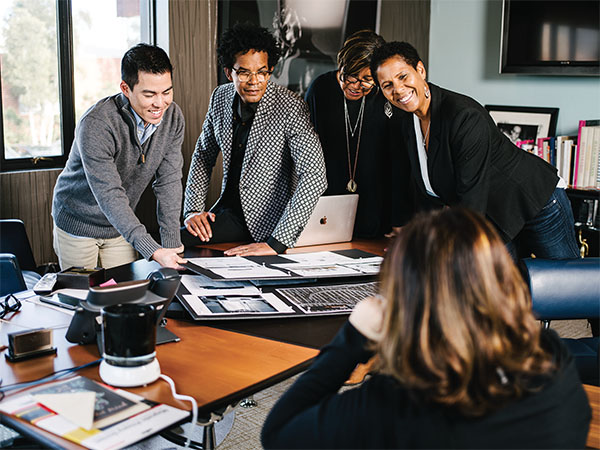
Photo: Mathew Scott
Aaron Walton ’83 encourages collaboration among all employees at his agency, Walton Isaacson.
Today the agency employs a remarkably diverse team, with more women than men and staff members who identify as black, Asian, Latino, mixed race, and LGBTQ. Walton is careful not to “silo” or limit his team by, for example, having Latino staff members work only on Latino accounts—an approach that is common, he says, at traditional ad agencies. Clients and employees benefit from exposure to a range of perspectives, he believes. Early in his career, Walton tended to ignore narrow-minded comments from clients, but not anymore. “I finally began to work with clients to explain the negative impact that stereotypical assumptions were having on their business,” he says. “It’s not a difficult concept. Let’s own and celebrate our diversity and all of the amazing things that come along with expanding our view of the world instead of marginalizing these cultures.”
Walton celebrates his own identity and also encourages employees to be fully themselves. “Being able to celebrate all of who we are is freeing,” he says. “People are less focused on conforming and more focused on innovation and being able to provide a point of view that no one else has.”
Diversity efforts at Babson go right to the top. Amanda Strong ’87, a Babson trustee, has worked with President Kerry Healey and others in the Babson community to make the Board of Trustees more representative of people of all backgrounds.
Read More…
Josuel Plasencia ’17 and Yulkendy Valdez ’17 say this level of acceptance is particularly appealing to millennial workers. The recent grads founded Boston-based Project 99, which helps companies teach young employees and their managers inclusive leadership skills, with the aim of retaining diverse talent and growing future leaders. “Professionals of color are three times more likely to quit their jobs, and this is costing companies an average of $6 billion a year,” Valdez claims. “Our idea is that if you’re able to put these millennials—who are going to become three-fourths of your workforce in less than 10 years—at the forefront of cultural change in the company, they are going to be more engaged, they’re going to feel more productive, and they will deliver for your bottom line.”
Studies show that more ethnically and racially diverse companies tend to outperform their less diverse competitors, say Plasencia and Valdez. The same goes for companies with more women leaders; they often have better financial performance than male-dominated competitors.
Plasencia and Valdez both were born in the Dominican Republic and moved to the U.S. as children. Plasencia was raised by a single mother in New York after his father was deported. Valdez lived near Ferguson, Missouri, and often worried about her little brothers when she saw news of a person of color dying at the hands of police. The two founders chose the name of their company after learning about the human genome at the 2014 Clinton Global Initiative conference; President Bill Clinton mentioned that 99.9 percent of human genes are identical, and differences among people account for only 0.1 percent of our genetic material. “We’re always asking, ‘How can you create leaders that embrace that common humanity that we all have but leverage the unique differences that we all bring to the table?’” Valdez says. “Imagine if Josuel was able to talk openly at work about his family, about living with a single mother and having a deported father. Imagine how much more at ease I would feel at work if I was able to talk about how police brutality in the African-American community impacted me growing up in St. Louis. These are the things we’re trying to do with Project 99, to help companies let out the 0.1 percent in all of our cultures so that people can be more engaged and more productive at work.”
Helping employees feel included and respected can be as simple as offering a listening ear, says Minea Moore, MBA’08, director of diversity and inclusion strategic initiatives at Intel. To that end, the high-tech company created the WarmLine, a program designed to help retain employees and staffed by advisers who troubleshoot a variety of confidential topics, especially around career goals. Since 2016, the line has processed around 10,000 cases, and research shows that 90 percent of those employees stay at Intel. Moore adds that hiring and retaining people with different ethnicities, genders, and sexual orientations creates important diversity of thought and different perspectives within a company. This kind of thinking, Moore says, can benefit the bottom line.
Nicole McCabe ’96 is now vice president of strategic initiatives in corporate development at software company SAP and was its global head of gender equality for almost five years. She says companies ignore diversity and inclusion at their peril and offers the example of Uber, which faced a dip in ridership after a female engineer detailed rampant sexism at the company. “You see a lot of these startups that aren’t thinking about their culture early on,” she says, “and then they grow and they’re successful, but they have all of these issues embedded into their culture that create a huge financial risk.”
Commitment at the Top
In January 2015, Intel CEO Brian Krzanich stood on a stage at the Consumer Electronics Show, which attracts almost 180,000 attendees and garners worldwide media coverage, and made a dramatic pledge: By the end of 2018, Intel would reach “full representation” within its workforce. “That means when you look at the makeup of employees inside Intel, it should match the available talent pool outside Intel,” Moore says. In the same speech, Krzanich committed $300 million to support that goal and accelerate diversity and inclusion, not just at Intel but across the technology industry.
Intel’s approach to diversity and inclusion is grounded in data. “We believe that what we measure gets done,” Moore says. “By setting measurable goals based on data, we’re able to ensure that we’re progressing.” These efforts appear to be working: In a total U.S. workforce of about 50,000, the gap to full representation is about 800 people today, down from 2,300 in 2014.
Ryan of PwC agrees that diversity efforts must start with company leaders. “The tone at the top and executive commitment is the single most important thing,” Ryan says. He adds that talented CEOs are particularly well-equipped to tackle tough problems creatively. “They can get transformative deals done,” he says. “They can be entrepreneurial. They can develop new technology. They can raise money and sell companies. When they put their minds to this, they can get it done.”
As a white man who spent his early childhood in the then mostly white Hyde Park neighborhood of Boston before moving to a predominantly white suburb, Ryan may seem a surprising leader in the quest for diversity and inclusion. But he witnessed the Boston busing crisis in the mid-1970s, when a court ordered the desegregation of Boston city schools. The nightly news showed frightening footage of rioters throwing rocks at buses. Images from this confusing time stuck with him.
After the success of the first ColorBrave conversations at PwC, Ryan admits he breathed a sigh of relief and planned simply to continue with existing efforts to recruit diverse talent. But a member of his team pressed him about his influence with companies outside of PwC. What could Ryan do to promote diversity and inclusion elsewhere? “That really, really got me thinking,” he says. As he traveled the country, meeting as usual with PwC clients, Ryan asked CEOs about diversity. “It became clear that many were struggling with how to become more inclusive and were not quite sure how to do it but wanted to do better,” Ryan says.
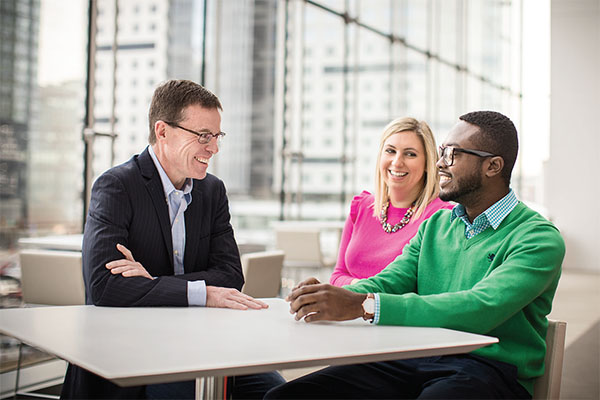
Photo: Tom Kates
Tim Ryan ’88 talks with employees in PwC’s Boston office.
He reached out to the CEO of consumer-goods company Procter & Gamble and the head of the Executive Leadership Council, an organization for the development of black leaders, as well as to PwC’s direct competitors. Conversations with these leaders eventually led PwC to launch an initiative called CEO Action for Diversity & Inclusion. Participating executives agree to take three steps: to create safe spaces in their companies for conversations about diversity, to provide training about unconscious bias to everyone, and to make best practices for diversity available to other businesses.
More than 360 companies now participate. This past November, 70 CEOs from these companies gathered in New York for a closed-door session about diversity, where leaders were encouraged to talk about uncomfortable topics. “We had an incredible day, where we all left smarter and maybe a little more courageous than we were coming in the door,” Ryan says. As part of its CEO Action initiative, PwC also recently added what it calls the President’s Circle, bringing academic institutions and associations on board. The goal is to engage students, faculty, and staff around issues of diversity and inclusion, given that students are the future employees and leaders of corporate America.
How to Recruit a Diverse Workforce
Finding qualified employees from diverse backgrounds is not as difficult as some people claim, believes Ryan. “I would say that’s one of my biggest pet peeves. We need to do a better job of finding the talent inside our organizations, broadening our recruiting nets and the like,” he says. “There’s so much talent out there in the world. To simply say it’s a talent pipeline issue, in my judgment, is a cop-out.” A CEO Action event addressed this issue, inviting 150 chief diversity officers and human capital officers to New York to share detailed strategies for inclusivity.
Several years ago, McCabe tackled the dearth of women in leadership roles at SAP by scheduling a two-day meeting on the topic. “I brought together everyone who handled core employee life-cycle processes—executive recruiting, our university recruiting folks, our succession planning folks, the people who handle leadership,” she says. “We talked openly about the data and the issues.”
They found, for example, that just 10 percent of employees in SAP’s fast-track leadership program were women. “The intent of the program was to accelerate future leaders, but how can you increase diversity when the primary recruiting pool is not diverse?” McCabe notes. So the group discussed ways to boost women applicants. “It was a great opportunity for everyone to get on the same page and understand the impact of their area on the greater goal,” she says. “Once you put the data up there, no one can really argue with it.” The proportion of women in leadership roles at SAP rose from 19 percent in 2011 to 25 percent in 2017, meeting goals the firm had set six months ahead of schedule.
In April 1998, a Black Affinity meeting at Babson led to the first Black Affinity Conference, now observing its 20th anniversary. Created to engage and retain students, improve recruitment, and re-engage alumni from the black community, the BAC continues to bring people together for learning, networking, and celebrating.
Read More…
Intel hopes that boosting STEM programs in schools will ultimately yield a larger, more diverse pool of technically trained employees in the future. In 2015, the company announced a $5 million investment in the Oakland Unified School District in California, including close partnerships with the district’s largest high school, Oakland Technical, and McClymonds High School, where students of diverse backgrounds make up about 90 percent of the population. The grant funded a new position to oversee the district’s computer science programs and a new computer science curriculum, as well as mentoring and summer internships at Intel. “When you look at how to fill the lack of diversity in technology, you need to start earlier than college,” Moore says. The changes already have helped, she says, pointing to a dramatic increase in the number of Oakland students taking computer science classes in the past two years.
While the company is making steady progress in its efforts to hire women and Hispanic and Native American employees, Intel is still lagging in its goals around the hiring, progression, and retention of African-American employees, Moore says. So Intel is increasing its focus on retention efforts and expanding recruitment at historically black colleges and universities. It also plans to host an African-Americans in Tech Thought-Leadership Summit to consider new ways to attract and keep black employees in these roles.
Plasencia of Project 99 says that one secret to retention is giving young minority employees opportunities to lead projects and teams. “This increases their ability to have a voice and makes them a stronger part of your organization,” he says. “They are more likely to stay and want to grow in the company.”
Companies also need to look at the role that unconscious bias—the judgments and assessments that people make without realizing they are doing as much—may play in hiring, Walton says. “I think every organization has it,” he says. “It helps to start to understand how it impacts your hiring decisions or impacts the clients you go after.” Making diversity “part of the DNA” of a company from the beginning, as Walton and his co-founder did, can help safeguard against such biases. Emphasizing a true willingness to listen intently to other people also is key, Walton adds. “Too often, people enter a conversation with a mental checklist of what they want out of it,” he says, “and their brains check out as soon as they establish that the other person meets their expectations—or doesn’t.”
A growing number of companies offer unconscious-bias training to help workers understand blind spots around diversity. PwC developed its training with Mahzarin Banaji, a Harvard professor and co-author of Blindspot: Hidden Biases of Good People. Ryan describes one scenario offered in PwC’s training: A car crash occurs, killing a father and gravely injuring his son. When the son arrives at the hospital, the surgeon says, “I can’t operate. This is my son.” Many people respond by wondering how that’s possible, given that the father died. But the surgeon is actually the patient’s mother. PwC requires the training for all new employees, as well as for established employees who want to be considered for a promotion. PwC’s President’s Circle also is calling on university leaders to help build diversity and inclusion course offerings into their curricula, and it has created a campus tour called Check Your Blind Spots, which pushes students to consider such issues before they enter the workforce.
Intel’s Moore acknowledges that corporate diversity training touches on sensitive topics. The company offers Managing at Intel, a program that includes diversity and inclusion training for its managers. “This stuff is hard,” she says. “You hear things that may hurt, and those unconscious biases are not an easy pill to swallow. But a healthy dialogue, actually having a discussion about it, is necessary to really drive change.”
Moving Away from Mandates
In her second job out of college, Moore, who is African-American, had a conversation with an older white male colleague. He expressed opposition to what he called “affirmative action” programs, which he believed hurt the employees they were designed to help. After working together for about a year, the colleague gushed to Moore that he was really impressed with her work. “I connected the dots back and realized that he probably thought I originally got that job not because of my capabilities, but because of ‘affirmative action,’” she recalls. “It was the first time that I realized people might be looking at me differently.”
During her career, Moore has seen thinking about diversity and inclusion initiatives change. Instead of viewing such programs as a way to comply with mandates and legal requirements, companies now are more likely to see them in terms of the tangible value they bring to businesses, she says.
Diversity and inclusion experts are working to move employees away from viewing diversity initiatives as an imposition. McCabe of SAP has come to realize that empathy is a key ingredient in making these programs productive. She helped boost SAP’s existing Business Women’s Network, and with a colleague she co-founded the Leadership Excellence Acceleration Program, which prepares women for leadership roles. McCabe notes that in 2016, SAP became the first tech company to earn Economic Dividends for Gender Equality (EDGE) certification, a global business standard for evaluating gender equality.
Sensing a lack of connection among female colleagues, McCabe also established a less-formal collaboration website to build community among SAP women. It features a webinar series, attended by women across the company. She chuckles thinking about the distancing politeness of the first webinars. Within a few sessions, however, attendees grew more candid and started sharing personal stories. One woman talked about a recent cancer diagnosis, for example, and women from all over the world chimed in to offer support. “You could see the trust and support that they started to bring to one another,” McCabe says.
Experiences like those reshaped her thoughts about what makes diversity initiatives effective. “Now it’s more, how do we evoke empathy for people? How can we help our employees have conversations, and, in some instances, relearn the process of agreeing to disagree?” McCabe says.
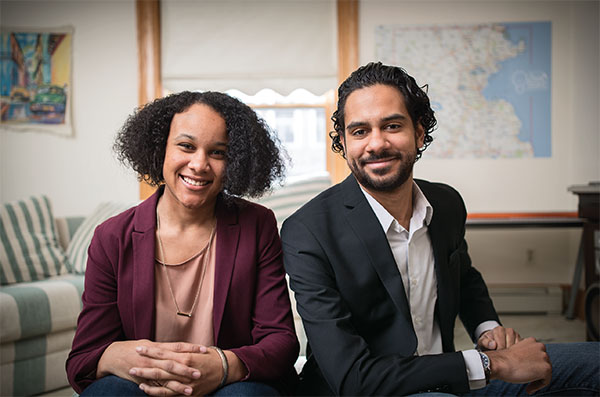
Photo: Tom Kates
Yulkendy Valdez ’17 (left) and Josuel Plasencia ’17, co-founders of Project 99
Valdez and Plasencia agree that stilted, forced conversations about race and diversity need to be replaced. “You’ve got to turn a transactional conversation into a human conversation again, which is going to be hard because these topics have been so politicized, especially recently, and have become very tense,” Valdez says. “You’ve got to find a way to sit in a room, starting with small pockets of your organization, and just talk about your own personal story. Start there, and then talk about how this has personally impacted you.”
Diversity and inclusion are worthy causes, Ryan reiterates. “It happens to be the right thing to do,” he says. At the same time, corporations will benefit from these initiatives. “When we make our companies more diverse,” Ryan says, “we create our country’s biggest competitive advantage.”
Erin O’Donnell is a writer in Milwaukee.
]]>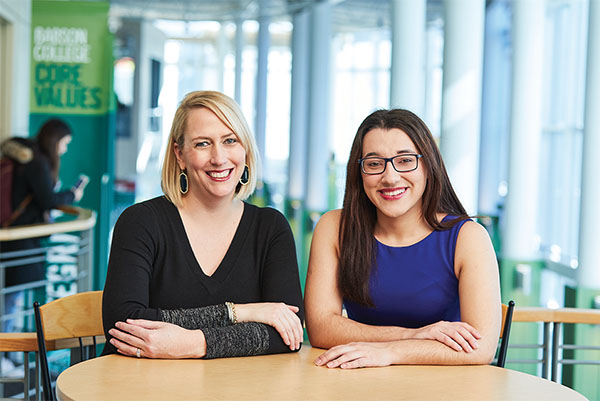
Photo: Pat Piasecki
Beth Wynstra (left), assistant professor of English, and Global Scholar Larissa Moreira ’20
During her first semester at Babson, Larissa Moreira ’20 felt homesick as Thanksgiving break approached. “It’s a family time,” she says. “I saw everyone leaving for home, and I wanted to go home, too. But it’s too far away.”
Home for Moreira is Brazil. A Babson Global Scholar, she comes from the industrial city of Betim, located in the southeastern part of the country, some 4,600 miles from Babson Park. Luckily for Moreira, though, she also has an adopted family much closer to campus. She is a participant in the Global Scholars Host Program, which matches scholars with a staff or faculty member as a way to help students transition to life in the U.S.
Moreira was matched with Beth Wynstra, assistant professor of English. For Thanksgiving, Wynstra invited Moreira into her home, where the student shared turkey, mashed potatoes, and conversation with Wynstra’s family and friends. “I am thankful she opened her life and family to me,” says Moreira. “I really wanted to be part of a family here.”
Launched in 2014, the Global Scholars Program provides need-based scholarships for highly talented international students. Matching students with hosts began in 2015 after program directors realized that some scholars were having trouble adjusting to school and life in America. Since then, 16 matches have been made, and any Babson faculty or staff member is eligible to be a host, says Jamie Kendrioski, director of international services and multicultural education.
Participating faculty and staff are asked to stay in regular contact with their students and meet with them monthly for an activity. Boating trips, apple picking, Christmas tree shopping, and Halloween parties are examples of activities that hosts have organized, though Kendrioski says students most appreciate simple dinners in the host’s home. “That’s what students love the most, to experience U.S. home life in a relaxed family setting,” he says.
Of course, students aren’t the only ones who benefit from the program. Faculty and staff have the opportunity to form a close relationship with someone from a culture much different from their own. “I think so many of us who work in higher ed want a deeper connection to students,” Kendrioski says. “That’s why we’re here.”
Wynstra and Moreira have spent a lot of time together. They’ve visited Walden Pond, gone to restaurants and campus events, and taken in productions of The Empty Space Theater, of which Wynstra is the founding artistic director. Wynstra says that she has enjoyed learning about Brazil and hearing about Moreira’s family, but even more she is inspired by the student. Not only is Moreira making her way in a place far from home, but she also is running a venture that she co-founded. That venture, InspiraSonho (“Inspire Dream” in Portuguese), is a platform that posts scholarships, competitions, and learning opportunities for high school students. “I know being a student and keeping that business going is not easy,” Wynstra says. “She is really thriving. I am deeply inspired by her.”
The initial commitment to the host program is for a year, but many matches stay in touch beyond the program’s end. Now in her sophomore year, Moreira no longer needs as much support as she did her first year, but she and Wynstra continue to chat and get together. “We created a relationship,” Moreira says. “I really enjoy the time we spend together.”—John Crawford
]]>After graduating from Babson, Heidinger headed to New York City to work for a small consulting and money-management firm that specialized in socially responsible investing. But she decided the fit wasn’t right, and within six months Heidinger accepted a position with FremantleMedia, a global television production company responsible for shows such as American Idol, The X Factor, and The Price Is Right. Her job involved supporting business that was generated by programs such as product placement. “The Coke cups on the desk that Simon Cowell and the other judges drank out of on American Idol? That was a deal that our team did,” Heidinger says.
She spent six years with the company, first in New York and then, looking for a warmer climate, in Santa Monica, California. Heidinger next took a special-events position with DreamWorks Animation, arranging movie premieres, global film launches, and company appearances at the Cannes Film Festival and trade shows. “It was an incredible company to work for, but I didn’t care much about the work I was doing,” she admits. “I was never star-struck. That made the 16-hour days really difficult.”
As her 30th birthday approached, Heidinger decided to fulfill a longtime dream by taking a three-week trip to Kenya. She went on safari and then spent a week in the slums of Nairobi, where she helped break ground for a women’s clinic and volunteered in an orphanage for children with addictions. The experience led her to question her career. “This world is so crazy. There are so many people in need, and here I was working in this posh job—but I was not helping anyone,” she recalls. “I was just making the wealthy wealthier and celebrating celebrities who already had everything they needed.”
At the end of her trip, she returned to California and resigned from her job. But perhaps even more surprisingly, she also realized that she wanted to break the pledge she had made as a teenager and head back to Buffalo. Her periodic trips home had intrigued her. She was discovering new restaurants and development in old neighborhoods, and Yahoo had opened a data center and customer-care facility. “More and more, you’d hear that some classmate from high school had moved back,” Heidinger says.
Around Labor Day in 2014, she packed her Mini Cooper and headed east, uneasy that she was moving back in with her parents and had no job or health insurance. But just a few months later in March, she was hired as director of special events and programming for 43North, a position that means serving as one of Buffalo’s chief cheerleaders.
In 2012, New York Governor Andrew Cuomo had unveiled the Buffalo Billion project to spur economic growth and job creation in the region. One of the initiatives included an annual $5 million business-plan competition that requires winning companies to move to Buffalo and stay for at least one calendar year. Heidinger’s employer, 43North, runs the competition, now in its fourth year. Each October, eight winners are selected and must establish operations in Buffalo by January 1. Heidinger helps employees of those companies settle into the Buffalo area and arranges entertainment itineraries that companies can use to impress important out-of-town visitors. “We recognize that if companies don’t love Buffalo, they’re probably not going to stay,” Heidinger says. “I do anything I can to open their eyes to what’s going on here and help them fall in love with Buffalo.”

Photo: Matt Wittmeyer
Colleen Heidinger plans to live on the second floor of the building she is renovating and open her own events business in commercial space on the ground floor.
Along the way, Heidinger appears to have fallen in love with her hometown as well. “The cost of living is unbelievable,” she says. “There’s no traffic. We have great dining. We have NFL and NHL teams, we attract all the shows and big bands, and after a night out you’re still able to get home in 12 minutes.”
She recently entered the Buffalo real estate market by purchasing a 1914 building in a revitalized area called Larkinville. She is rehabbing the building, planning to live on the second floor and open her own events business in a commercial space on the first floor. “I often tell kids that I mentor, ‘There’s no better place to fail,’” Heidinger says. “If this real estate project blows up, I didn’t use my whole savings account or sign my life away. If I did this in Greenwich Village, you can bet it would be all my money. If you have an idea you want to test out, or need to hire 20 people, Buffalo is a good place to do it.”
Still, coming home has had its challenges. Heidinger enjoys being part of a small, tight-knit community but notes that dating was tough at times. (She now is seeing “a very great guy.”) She also is grateful for Babson friends scattered around the country, including those in New York City and Boston who give her a regular place to land when she needs a big city fix. “I do need to get out of here sometimes,” she says. “But then I’m very happy to come back.”
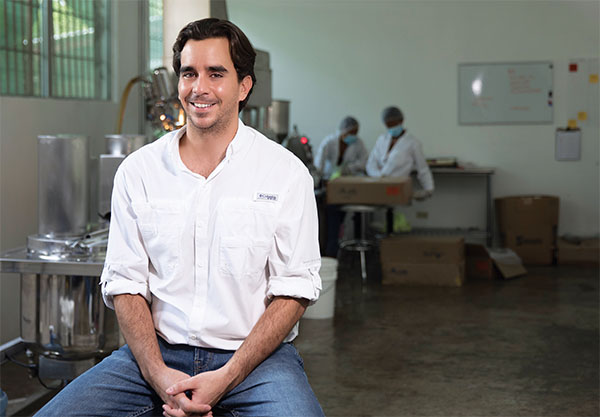
Photo: Roberto Muñoz
Dan Dalet ’03 co-founded SoloCoco in his homeland of the Dominican Republic to help the economy and provide employment for locals, many of whom are single moms.
Hope Through Work
Growing up in the Dominican Republic, Dan Dalet ’03 and his two brothers lived a comfortable life. They attended good schools, their father worked for a bank and later the auto company Fiat, and their mother was a portrait photographer. As a surfer, Dalet took full advantage of the white sand beaches and amazing weather.
But Dalet also knew the DR’s strong GDP and popular tourist resorts didn’t tell the whole story of his country. “If you drive 10 miles in the opposite direction of those beaches, you find yourself in poverty and underdevelopment,” he says. “As a youth, I always had the idea that someday I would come back to my country and add value.”
First, he traveled to Babson to earn his undergraduate degree. Intrigued by the world of finance, he worked for a private bank in Florida after finishing his studies, and then he helped establish a Boston-based hedge fund comprising entrepreneurial companies. But around the time of the economic collapse in 2008, Dalet began rethinking the long hours and stress of his job, and he couldn’t shake the nagging feeling that his work wasn’t making a lasting impact on the economy or people’s lives.
Dalet began to wonder if it was time to head home. He imagined doing his part for the local economy by launching a company, and he was casting around for ideas when a conversation with his parents grabbed his attention. They were talking about the health benefits of coconut oil. Initially, Dalet was skeptical, but then his uncle, a physician, chimed in, saying that he thought new research about coconut oil was compelling. It was the proverbial lightbulb moment. “I thought, we’re surrounded by coconuts here,” Dalet says. “Why aren’t we making very high-quality, organic coconut oil?”
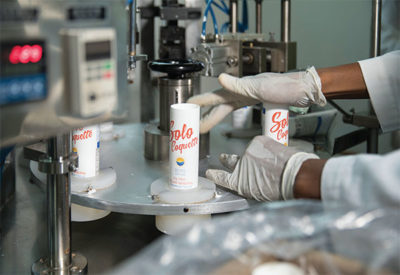
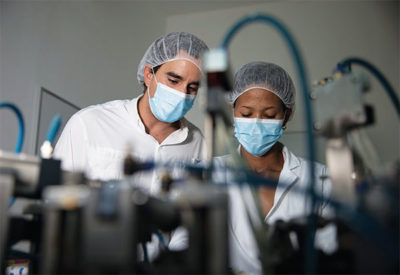 Photo: Roberto Muñoz
Photo: Roberto Muñoz
Dan Dalet (left) at SoloCoco
Historically, the Dominican Republic has harvested coconuts and exported them as produce or raw material. But Dalet imagined something new: processing the coconuts and turning them into high-quality products before export. So in 2011 he and his wife moved to the DR, and Dalet dove in, experimenting with the production process at a manufacturing facility he established in a rural area 3 1/2 hours from the capital. A year into the venture, however, Dalet hit a significant roadblock. When trying to recruit workers, he discovered that few were available, because most had left the rural area to find work in the city.
Undaunted, Dalet started over. This time he partnered with his cousin Abel Gonzalez, opening a new plant in San Pedro de Macoris, a city with a population of about 195,000 in the southeast region of the island. As they prepared once again to bring on staff, they advertised a willingness to hire applicants who lacked typical experience but demonstrated promise and a desire to work.
One morning in November 2014, they drove to their plant to interview potential employees. What they encountered stunned them. “There was a line of more than 250 women waiting outside,” Dalet remembers. Most were single mothers in their mid-20s, raising three to five children on their own. Many never had attended high school. One woman told Dalet that she was willing to do anything to feed her children, but no one would hire her.
“The sense of despair and hopelessness impacted us profoundly,” Dalet recalls. Although he always had been aware of income disparity in the DR, Dalet still was startled by the severity of the poverty and the lack of options for these women and their children. He and his cousin saw their upbringing and access to education with new eyes. “That day changed us as human beings,” he says, “and changed us as entrepreneurs.”
Running a successful company would no longer be enough. Dalet and Gonzalez made a strategic decision to launch as a socially conscious venture designed around the well-being of its workers. They called their company SoloCoco, which translates to “just coconut” in English. (“Just” is intended as a double-entendre, meaning both “simply” and “fair,” Dalet says.) They hired more women than they initially planned and created a flexible work schedule that would allow employees to work as little as one or two days a week.
Dalet has seen statistics suggesting that a high percentage of children in the Dominican Republic are born to single mothers. These children are more likely to experience poverty and drop out of school, he notes. Many don’t attend school because they lack basic resources, such as school supplies. Those who do attend often experience frequent illnesses and absences because of a lack of sanitation and basic health care. These factors put high school graduation out of reach for many children of single mothers, Dalet explains.
Faced with these daunting statistics, Dalet worked to earn certification by the Fair Trade Sustainability Alliance, a New York-based organization that oversees the well-being of a company’s workers. In addition to offering his workers health care, Dalet partnered with FairTSA to set up a co-pay fund to help with costs not covered by insurance and a fund to cover the cost of school supplies for employees’ children. Another initiative, driven by SoloCoco staff, focuses on employee housing and sanitation. Last summer, the company built its first concrete house, complete with indoor plumbing, for one of SoloCoco’s single-mom employees.
The business is growing. SoloCoco now sells its coconut oil and body-care products in more than 10 countries, and they are carried by 75 Whole Foods stores in the Northeast U.S. This growth comes with challenges, however. “Our biggest problems right now are cash flow and capital requirements,” Dalet says. “It’s harder to find startup funds in the DR, and we can’t borrow money because interest rates are high and lending for small businesses is rare. We’re all self-funded at this time.” Others in Dalet’s family contribute to the business. His wife is a certified natural skin-care formulator, and she develops the company’s organic, personal-care product line. When Dalet’s father retired from Fiat two years ago, he began working for the company in an administrative role.
Dalet says he is motivated daily by what SoloCoco means for his employees. “The most important reward has been seeing the transformation of these families and these kids,” he says.
He and his cousin hope their success motivates more entrepreneurs to come home. “If we do a good enough job with this, it’ll inspire more people to come back and build on our trails,” Dalet says. “This country doesn’t need one SoloCoco. It needs 1,000 of them.”
An Agent of Change
Alex Souza ’09 was born in Mexico City. Although his family moved to San Diego when he was 2, they returned to Mexico City in time for him to start high school. Part of the motivation around the moves was an opportunity to experience other cultures. “Our parents really wanted us to go out there and see the world,” Souza says. “If there was money to spend, we spent it on travel.”
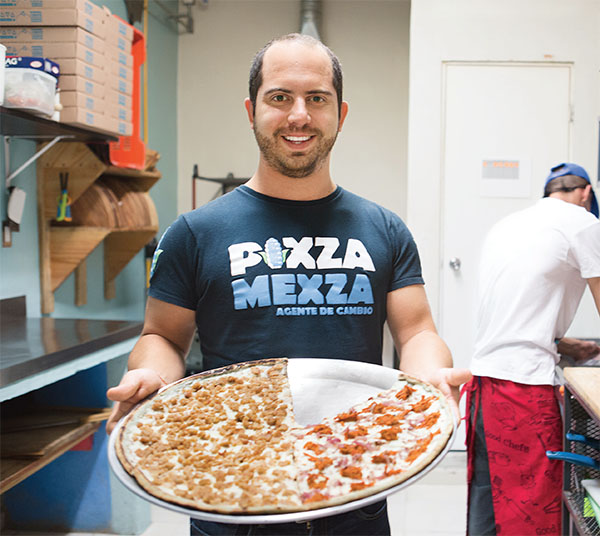
Photo: Alicia Vera
Alex Souza ’09 founded Pixza in Mexico City to help homeless youths change their lives.
His mother, Alejandra, also instilled in Souza and his sisters the importance of helping those in need, bringing them to volunteer with Mother Teresa’s Missionaries of Charity in Mexico City. A life coach, Alejandra taught her children that the best way to help people is by offering them tools to reshape their lives. “That’s always been a big thing in my family, to recognize that you are an agent of change,” he says. “If you want to change the world, you cannot sit around and wait for things to happen.”
When the time came for college, Souza chose Babson for its focus on entrepreneurship and the chance to live in a new place. His college years included a semester at sea and opportunities to study abroad at the London School of Economics, as well as in Uganda and Hong Kong. After college, he returned to Africa with fellow Babson alumni to start an English-language school and management-training program in Rwanda. The program included an initiative that helped underprivileged students; for every 12 students who paid full tuition to the program, one student attended tuition-free.
After successfully launching the business in Rwanda, Souza wanted to build his knowledge of social and economic development. So he sold his stake and enrolled at Columbia University for a master’s in public administration and development practice. While in school, he spent a semester in Bhutan and introduced a program that measures national well-being. After graduation, he moved to Rio de Janeiro to work with the Inter-American Development Bank, which aims to reduce poverty and inequality in Latin America and the Caribbean through financial and technical support; Souza helped establish sports programs for youths living in Rio slums.
When his contract with the IDB ended, Souza turned his attention to home. “I had already helped solve issues outside my own country and learned so much,” Souza says. “But after working in Rwanda and Uganda, Brazil and Bhutan, I decided to go back to Mexico to see what I could do here.”
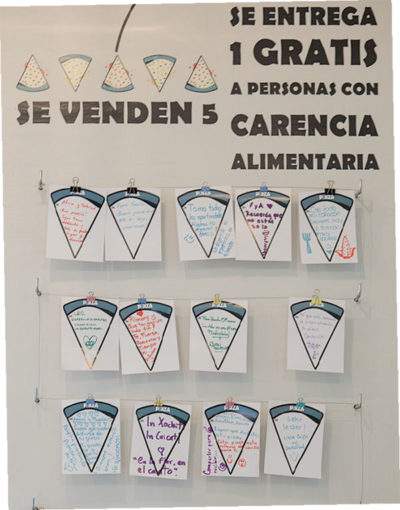
Photo: Alicia Vera
Sign inside Pixza
Souza felt drawn to the plight of Mexico City’s homeless teens and young adults, many of whom are born into homelessness. Hoping to intervene before these youths became adults, Souza began to think about ways to use his Babson-earned entrepreneurial skills. While at grad school in New York City, he had craved a Mexican food known as huarache, which is made with blue corn, and he theorized that the ingredient might make a tasty pizza crust. The idea resurfaced when he decided that a restaurant would make an ideal work experience for homeless youths. Souza spent four intense months developing a blue corn pizza crust that could be topped with traditional Mexican ingredients, including grasshoppers and zucchini blossoms. He called his restaurant Pixza (based on a common Mexican pronunciation of “pizza”), and envisioned “a social empowerment platform disguised as a pizzeria.”
For every five slices sold at the restaurant, the Pixza team donates a sixth slice to youths at a nearby homeless shelter. They deliver all the slices on Sundays. But Souza aims to do more than feed the teens. “It starts with a slice, because that’s a good reason to come together and talk,” he says. “But we want to move on to something bigger.”
Based on his previous experiences with social empowerment programs, Souza developed a detailed, multistage intervention that he calls “The Route of Change.” When youths at the shelter receive their first piece of pizza, they also receive a bracelet, which is punched each time they accept a slice. After the fifth slice, they must complete a small volunteer project of their choice, such as delivering a slice of pizza to a friend. “Instead of just being willing to receive, they have to be willing to give as well,” Souza says.
Kids who don’t complete this step are out of the program. Those who finish receive five more slices and a chance to complete a larger volunteer project. If they hit that milestone, they advance to receiving a shower, haircut, doctor’s appointment, T-shirt, and daylong life-skills course. When they complete those steps, they receive a formal job offer at Pixza, a regular salary, and a job title: Agent of Change. They get restaurant skills training and their own life coach. “The coach helps them develop a personal and professional plan,” Souza says. “Since they’ve been living on the streets, many don’t have the ability to dream.”
Professional life coaches, including Souza’s mother, usually donate time to work with the teens. In the final stages of the program, Souza and his team help participants find housing. Since Pixza launched in 2015, it has graduated and employed 23 kids, including four who have moved into housing. The entire program is funded by restaurant revenues.
Souza has opened a second location but has learned that restaurant management isn’t his strong suit, so he currently is seeking a business partner with this expertise. “I want a partner who actually loves to run restaurants, so we can open up many more locations, and I can focus on the part I’m better at, which is the social empowerment aspect,” Souza says. One day, he hopes to open an institute where he can train homeless youths for a range of roles in the food and beverage industry.
Pixza’s success has taught him the power of business to address social problems. “You can make that an objective from day one,” he says. “It’s amazing how you can use a for-profit business to make a difference.”
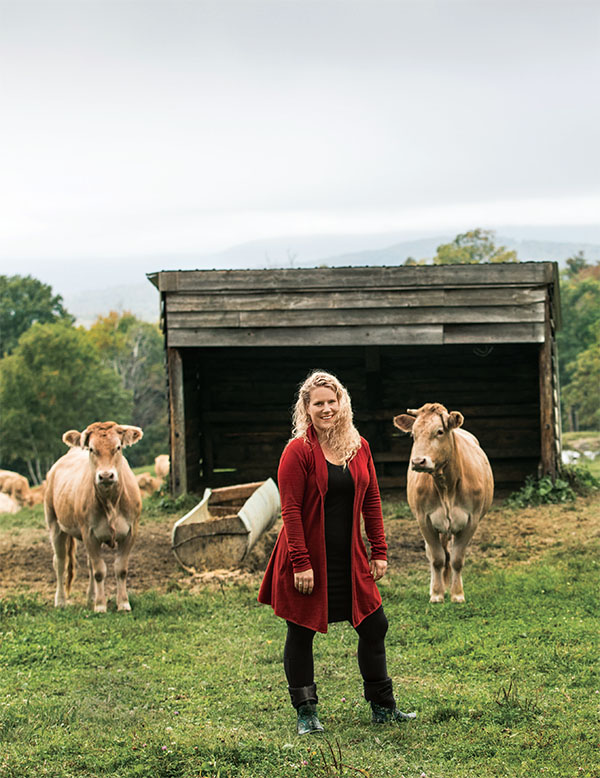
Photo: Greta Rybus
Jessica Wright ’11 lived in Ireland for two years, but she knew she would return to North Conway, New Hampshire, some day. Now she’s a local food systems advocate and part of a group that encourages young adults to settle in the area.
Building Communities
Jessica Wright ’11 adored her childhood in North Conway, which is in the White Mountains of New Hampshire. She was 10 when her family moved to this village, popular with tourists, skiers, and hikers. Her mother and stepfather opened the Metropolitan Coffee House in a historic building that once held North Conway’s bank. Wright and her sister spent much of their teen years working at the family business. “It evolved into this really cool community space where people would come and go for open mic night,” Wright says. “Our friends would come for teen night. Given the small town, and the central location, we knew everyone in town.”
While at Babson, however, Wright became interested in travel. She spent a semester in Ireland at University College Cork and fell in love with the place. After graduation, Wright interned with the Family Equality Council in Boston and considered law school, but she decided instead to return to County Cork in Ireland. She spent two years working as a nanny, traveling, playing rugby, and volunteering on organic farms. Those volunteer stints fueled Wright’s passion for farming and locally grown food.
As Wright prepared to leave Ireland, she applied to law school, but life as a lawyer still didn’t feel quite right. Then she found a master’s program at Vermont Law School focused on environmental law and policy. It would prepare her for a career in advocacy, and, apart from occasional on-campus courses in Vermont, she could do most of the work online, clearing the way for her to return to North Conway. “Coming back from Ireland, I just knew that I wanted to be here,” she says. “I love being in the mountains and an hour from the ocean. I love the snow and skiing. There’s nothing like hiking in the White Mountain National Forest in the fall, when the trees look like they’re on fire because the colors are so phenomenal. And I think my favorite part is that the Saco River runs right through the heart of where we live.” Wright takes frequent hikes along the water and ends hot summer runs with a dip in the river.
As she wrapped up her master’s degree, Wright began volunteering for the Upper Saco Valley Land Trust, a North Conway-based organization that aims to protect land from development. The work seemed like a good way to use her environmental law expertise to give back to the village; Wright served on the development committee and then took a part-time administrative position. When the land trust received several grants to support regional food-system projects, the leadership team used the funds to offer Wright a full-time position as a local food systems advocate, which she enthusiastically accepted.
“I work with family-scale farms to make sure that farming is a viable enterprise here,” Wright says. She leads collective efforts to help farmers market their products, creating and maintaining directories that allow customers to find local food, and working to promote area farmers markets. Wright feels lucky to spend her days visiting local farms, checking out greenhouses, fields, and farm animals. “That’s what I’m working for, to make sure that these people can keep doing what they’re so passionate about,” she says.
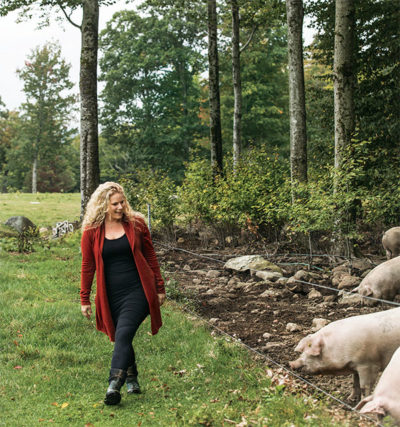
Photo: Greta Rybus
Jessica Wright works for the Upper Saco Valley Land Trust.
But Wright’s choice to live in North Conway also involves some sacrifice. Because it’s a tourist area, housing can be expensive. At the same time, salaries typically lag behind those in cities, so Wright holds a second job as a bartender to help pay her student loans and mortgage. Also, few other permanent residents are in their 20s or early 30s. “People who might want to put down roots are delaying that until they’re 35 or 40,” Wright says. “They work on their careers in Boston or Portland or Portsmouth and wait until they have a better handle on their finances to come back and raise their families.”
Hoping to find solutions, Wright is chair of a group known as STAY MWV, for Supporting the Active Young Professionals of the Mount Washington Valley. In 2016, the group established a student debt scholarship that helps pay recipients’ loans for up to a year. “We’ve had so many discussions about the apparent lack of young people and examined the barriers to living up here,” she says. “If we could alleviate student debt for someone for one year, think how much more engaged they could be in their community. They could leave that second job and coach soccer or save for a house.”
Wright plans to continue her efforts to convince young adults to commit to North Conway. “The best thing about the work I do is knowing I’m benefiting the community that helped raise me, that’s helping raise a whole new generation of children, and where I’ll hopefully raise my own children one day,” she says. “That’s so rewarding.”
]]>